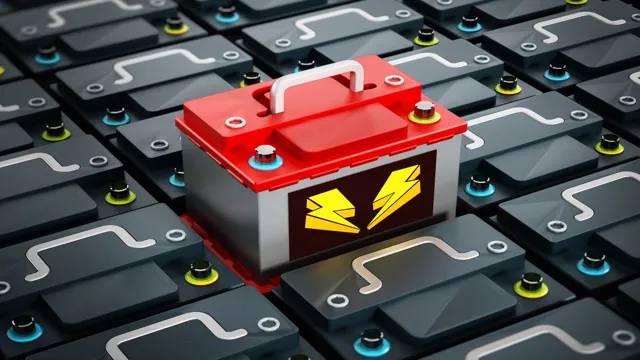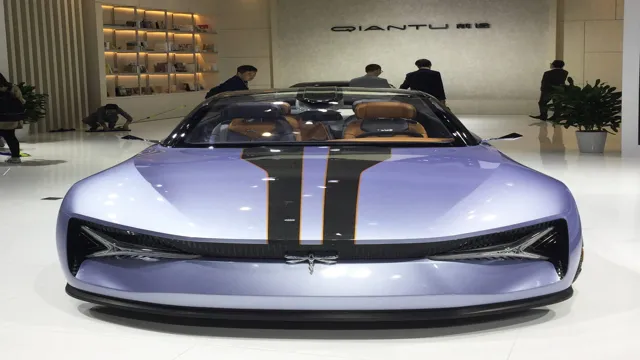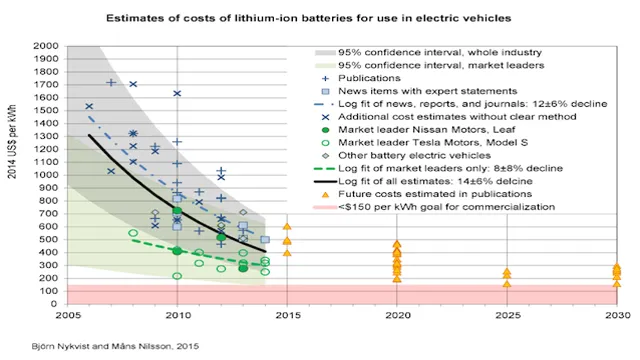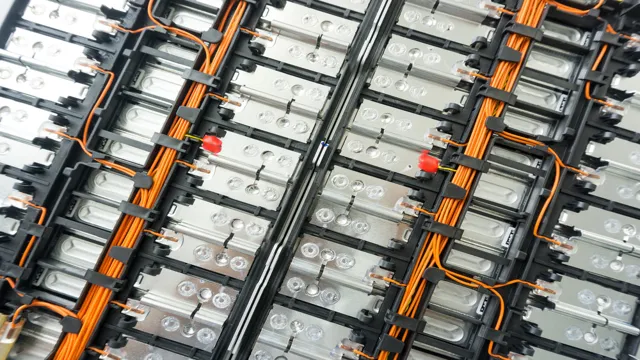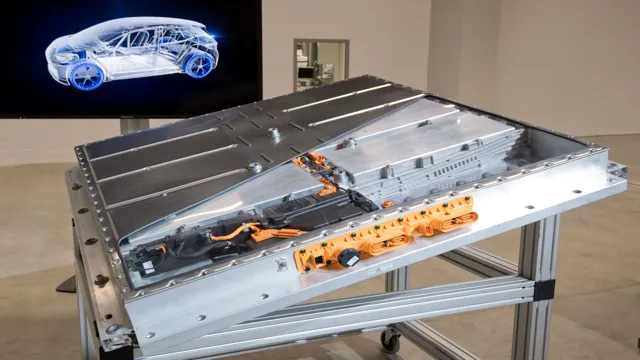Revolutionizing Mobility: The Future of Electric Cars with Batteries Made from…
Electric car batteries have revolutionized the automotive industry by offering an eco-friendly and cost-effective alternative to traditional gasoline-powered vehicles. With the rise of climate change concerns around the world, electric cars are becoming increasingly popular, and so are the batteries that power them. As electric vehicles continue to gain more traction, the technology behind the batteries used to power them is also evolving rapidly.
With that, comes a crucial question, what makes electric car batteries distinctive and how efficient are they? In this article, we’ll explore the different types of electric car batteries, the pros, and cons of each one, and the advancements made in the technology over the years. Let’s dive in!
The Future of Energy Storage
Electric car batteries made from advanced materials such as lithium, cobalt, and nickel are the future of energy storage. These materials offer high energy density, making them ideal for use in electric car batteries. Lithium-ion batteries are currently the most commonly used in electric vehicles due to their high energy density and ability to recharge quickly.
However, researchers are exploring new materials and technologies to improve the efficiency and cost-effectiveness of electric car batteries. Some of these materials include sodium-ion, solid-state, and flow batteries. As the demand for electric vehicles increases, advancements in electric car battery technology will continue to be a major focus in the industry.
With the right investment and research, we can expect to see more efficient, reliable, and sustainable energy storage solutions in the future.
What are Electric Car Batteries made of?
Electric cars have revolutionized the transportation industry, and electric car batteries are the unsung heroes that power these vehicles. These batteries are typically made from lithium-ion, which are lightweight and efficient. Inside these batteries are anodes and cathodes that house the lithium ions, and a separator that prevents the two from touching.
The battery’s electrolyte then facilitates the movement of ions between the anode and cathode, creating an electrical current that powers the car. The future of energy storage is bright, as there is a growing interest in developing more efficient and sustainable ways to power our cars. Scientists are exploring new battery technologies, such as solid-state batteries, which offer higher energy density and safety benefits.
As the demand for electric cars continues to grow, so too will the development of new battery technologies, which will shape the future of energy storage.
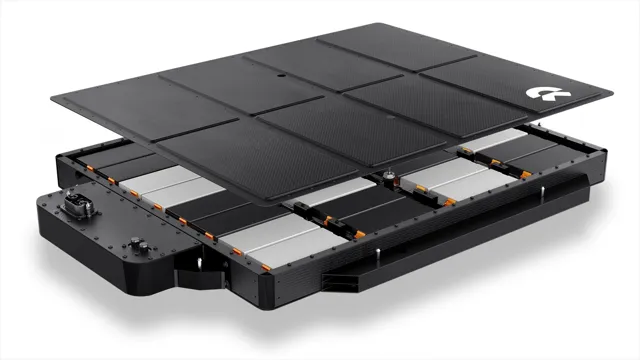
Lithium-ion: The Leading Technology
Lithium-ion batteries are currently leading the way in the world of energy storage. Thanks to their high energy density, long lifespan, and ability to recharge, they have become the go-to for applications ranging from electric vehicles to renewable energy systems. Lithium-ion batteries are also constantly improving, with advancements in technology leading to even better performance.
This means that the future of energy storage is looking increasingly bright. As we continue to transition to a more sustainable future, the importance of reliable and efficient energy storage will only continue to grow. With Lithium-ion batteries at the forefront of this movement, we can look forward to a future that is both green and efficient.
The Environmental Impact
Electric car batteries made from materials like lithium and cobalt have a significant impact on the environment. These materials are often mined in environmentally sensitive areas, which can lead to habitat loss and pollution. Additionally, the manufacturing process for these batteries requires a significant amount of energy, which can contribute to greenhouse gas emissions.
However, electric car batteries also have the potential to reduce overall emissions and improve air quality, especially in urban areas. It’s important for car manufacturers to prioritize sustainability and responsible sourcing when producing these batteries. As consumers, we can also make a difference by choosing to support companies with strong environmental values and by considering the lifecycle impact of the products we purchase.
Reducing Emissions with Battery Recycling
Battery recycling is a crucial step towards reducing emissions and improving the environment. Since batteries contain harmful chemicals and metals, improper disposal can lead to negative impacts on ecosystems. Recycling batteries helps prevent the release of these toxins into landfills and water sources, preserving the environment.
By recycling batteries, we can recover useful materials that can be reused in future productions. This reduces the need for mining, which is energy-intensive and can harm the environment. Furthermore, battery recycling conserves resources and reduces greenhouse gas emissions.
It is essential to make battery recycling a priority to reduce our carbon footprint and promote a sustainable future. Let’s do our part by properly disposing of batteries and supporting initiatives that promote battery recycling.
Mining Challenges for Sustainable Production
Mining for precious minerals and metals can be extremely lucrative, but it comes with many environmental challenges that must be addressed for sustainable production. One major challenge is the impact on the natural environment. Mining operations can cause deforestation and land degradation, leading to the loss of habitat for wildlife and disruption of ecosystems.
Extraction processes often require large amounts of water, which can lead to water pollution and depletion. Furthermore, the process of mining releases greenhouse gases and air pollutants that contribute to climate change and pose health risks to nearby communities. To address these challenges, mining companies must prioritize sustainable practices, such as using eco-friendly technology and reducing waste.
It is essential that mining operations are done responsibly and sustainably to minimize their impact on the environment and ensure a long-term future for the industry.
Exploring Alternative Materials for Battery Production
As we continue to rely heavily on batteries for many of our electronic devices, researchers have started exploring alternative materials for battery production. However, it’s essential to consider the environmental impact of these alternatives. For instance, some materials may be more sustainable than others, but they may still require extensive mining or extraction efforts that could harm the environment.
Additionally, some materials used in battery production are toxic and can be harmful to human health. As we search for new battery materials, we must balance the environmental impact with the need for sustainable energy sources. It’s crucial to prioritize materials that are environmentally friendly, renewable, and non-toxic.
By doing so, we can create a more sustainable future and reduce our impact on the planet.
Improving Performance & Efficiency
Electric car batteries made from advanced materials like lithium-ion and solid-state technology are revolutionizing the automotive industry by providing improved performance and efficiency. These batteries have a higher energy density than traditional lead-acid batteries, allowing electric cars to travel longer distances on a single charge. Additionally, electric car batteries made from these advanced materials can charge much faster than their traditional counterparts.
This means that drivers can stop for a quick charge and get back on the road in much less time than it would take with a traditional battery. The increased energy density also makes electric cars more practical for everyday use as they can reach higher speeds and are more capable of handling larger loads. As a result, we can expect to see more widespread adoption of electric vehicles as technology continues to advance and electric car batteries made from advanced materials become even more efficient.
Advancements in Battery Chemistry
Battery chemistry has come a long way in recent years, with advancements focusing on improving performance and efficiency. One of the most exciting developments is the use of lithium-ion batteries, which have a higher energy density and longer lifespan than traditional lead-acid batteries. These batteries are also more environmentally friendly, as they do not contain heavy metals that can be harmful to the planet.
Another exciting development is the use of solid-state electrolytes, which can increase the safety and stability of batteries. With these advancements, we can expect to see longer-lasting, more efficient batteries that are safer for the environment. So the next time you’re using a device powered by a lithium-ion battery, take a moment to appreciate the impressive chemistry behind it.
Increasing Power & Range with Solid-State Batteries
Solid-State Batteries Solid-state batteries are revolutionizing the world of energy storage, offering increased power and range for a variety of applications. Compared to traditional lithium-ion batteries, solid-state batteries have a higher energy density, making them more efficient. Additionally, they are safer and longer-lasting, reducing the need for frequent replacements.
One of the main advantages of solid-state batteries is their ability to scale up power density while maintaining high energy density, making them an ideal choice for electric vehicles. This technology is expected to increase the range of electric cars and reduce charging times, making them more practical for longer journeys. In the near future, solid-state batteries may replace traditional batteries in many applications, improving performance and efficiency while reducing environmental impacts.
Conclusion: The Bright Future of Electric Car Batteries
In conclusion, electric car batteries made from advanced materials like lithium-ion and solid-state technology are a powerful combination of innovation and sustainability. Not only do they offer longer ranges and faster charging times, but they also reduce greenhouse gas emissions and rely on renewable energy sources. So, when it comes to fueling our future, let’s charge ahead with these electrifying batteries!”
FAQs
What materials are used to make electric car batteries?
Depending on the type of battery, materials such as lithium, nickel, cobalt, and manganese may be used to make electric car batteries.
What advantages do electric car batteries made from these materials have over other types?
Electric car batteries made from lithium, nickel, cobalt, and manganese tend to have higher energy density, longer lifespan, and better performance in extreme temperatures compared to other types of batteries.
How long do electric car batteries made from these materials typically last?
The lifespan of electric car batteries made from lithium, nickel, cobalt, and manganese can vary depending on usage habits and maintenance, but they generally last for several years and can withstand hundreds of charging cycles.
Are there any environmental concerns associated with producing these types of electric car batteries?
Like any manufacturing process, producing electric car batteries made from these materials can have environmental impacts, such as energy consumption and emissions. However, efforts are being made to improve the sustainability of the battery production process and increase the use of recycled materials.
